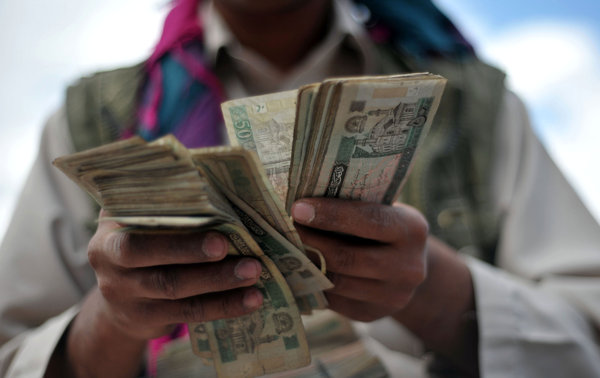Corruption Still Rampant In Afghanistan
Corruption in Afghanistan

NEW DELHI: John Sopko, special inspector general for Afghanistan reconstruction, re-emphasised the rampant presence of corruption in Afghanistan, in a speech at Georgetown University. "This is astonishing, given that Afghanistan is one of the most corrupt countries in the world and a country that the United States is spending billions of dollars in. "Yet there has been no progress made toward developing a unified anti-corruption strategy," Sopko said.
Sopko’s concerns were also presented in a report released earlier this year, that highlighted a range of challenges facing Afghanistan. Corruption figured foremost on the list, with the report noting that initial U.S. strategy in Afghanistan fostered a political climate conducive to corruption. Massive military and aid spending overwhelmed the Afghan government’s ability to absorb it. This, coupled with weak oversight, created opportunities for corruption. The report placed onus of the blame on lack of political will on the part of both the international community and the Afghan government to combat corruption resulting in a culture of impunity.
Focusing on US strategy in a subsection of the report titled “too much money, too little oversight,” the report noted that “the deluge of military and aid money into Afghanistan” overwhelmed the Afghan government’s ability to absorb these funds. This, coupled with weak oversight by U.S. implementing agencies and other international donors, “created ample opportunities for corruption.”
The report noted that reconstruction assistance has dwarfed the size of the Afghan economy. For instance, according to the World Bank, Afghanistan total GDP in 2010 amounted to about $15.9 billion. That year, Congress appropriated President Obama’s’ request for more than $16 billion to build Afghanistan’s security forces, government and economy. This did not include the tens of billions of dollars spent that year on US military operations in Afghanistan. Since 2010, Congress has provided nearly $64 billion for reconstruction programmes.
The report highlighted the need to arrive at a clear, shared definition of corruption and a full appreciation of how Afghans perceive corruption. It further noted that neither the international community nor the Afghan government have been fully committed to combatting corruption and called for the need to develop a comprehensive anti corruption strategy.
Corruption was identified as a deep rooted structural problem, with internal factors including weak institutional capacity at the national and provincial levels, weak legislative and regulatory frameworks, weak enforcement of laws and regulations, poor and/or non merit based recruitment of public officials, low salaries and insufficient numbers of law enforcement officials, lack of complaint mechanisms and systems for public security, and illegal profits from cross border smuggling and opium trade.
The report found that that opium cultivation in the conflict ridden country was at an all time high despite the US spending $7.5 billion to tackle it. Since 2012, there has been a 36 percent increase in the land being used for poppy cultivation in Afghanistan, currently at a record 209,000 hectares (516,230 acres). Drug use amongst Afghans has also seen an increase according to the report, with 1.3 million Afghan adults being classified as regular drug users, an increase from 1 million in 2009.
In a section titled “petty corruption on a grand scale” the report noted that whilst it is difficult to ascertain exactly how much Afghans pay each year in bribes, the estimates point to substantial figures. The United Nations Office of Drugs and Crime (UNODC) reported last year that in 2012, “half of all Afghan citizens paid a bribe while requesting a public service” and that “bribes paid to public officials amounted to US $3.9 billion,” equivalent to 20 percent of the country’s gross domestic product.
The report stated that “grand corruption undermine public trust,” thereby impeding Afghan revenue collection, jeopardizing economic development and thwarting efforts to establish the rule of law. The report calls for “establishing and sustaining a long term, coordinated, multi front attack on corruption… for the future of the country and its people.”



